65-year-old Lily Tan tentatively caressed Stardom’s mane. She had always been afraid of animals and this was her first time interacting with horses.
The meditative motion reminded her of how she stroked her late husband’s hair in hospital during his last days of fighting leukaemia .
Her husband, who loved the outdoors and camping, passed away a month ago and Tan’s grief is still raw. The blind horse leaned its body gently against her.
“I don’t understand why it keeps coming near me, maybe it wants a cuddle? It must be so comfortable to want to lean against me,” Tan mused.
Tan stepped aside to let her daughter Sarah enter the space. With the younger woman, Stardom lowered his head and nuzzled his face against her leg affectionately.
On cool Sunday morning at the horse stables, the rain drizzling softly outside, amongst around 60 retired racehorses and aged ponies, Tan and her daughter were participating in an equine interaction session organised by HERD Singapore, a social enterprise founded in December 2021.
Initiatives such as HERD, which believe in the healing power of horses and aspire to give more people a chance to have meaningful interactions with these animals, are gaining popularity in Singapore.
Fuelled by the pressures of the pandemic, the demand for new avenues and practices for mental welfare are rising in the city-state and equine therapy practices such are emerging as a critical resource and provide a rare pocket of serenity carved out in one of the most high-stress and urbanised cities in Asia.
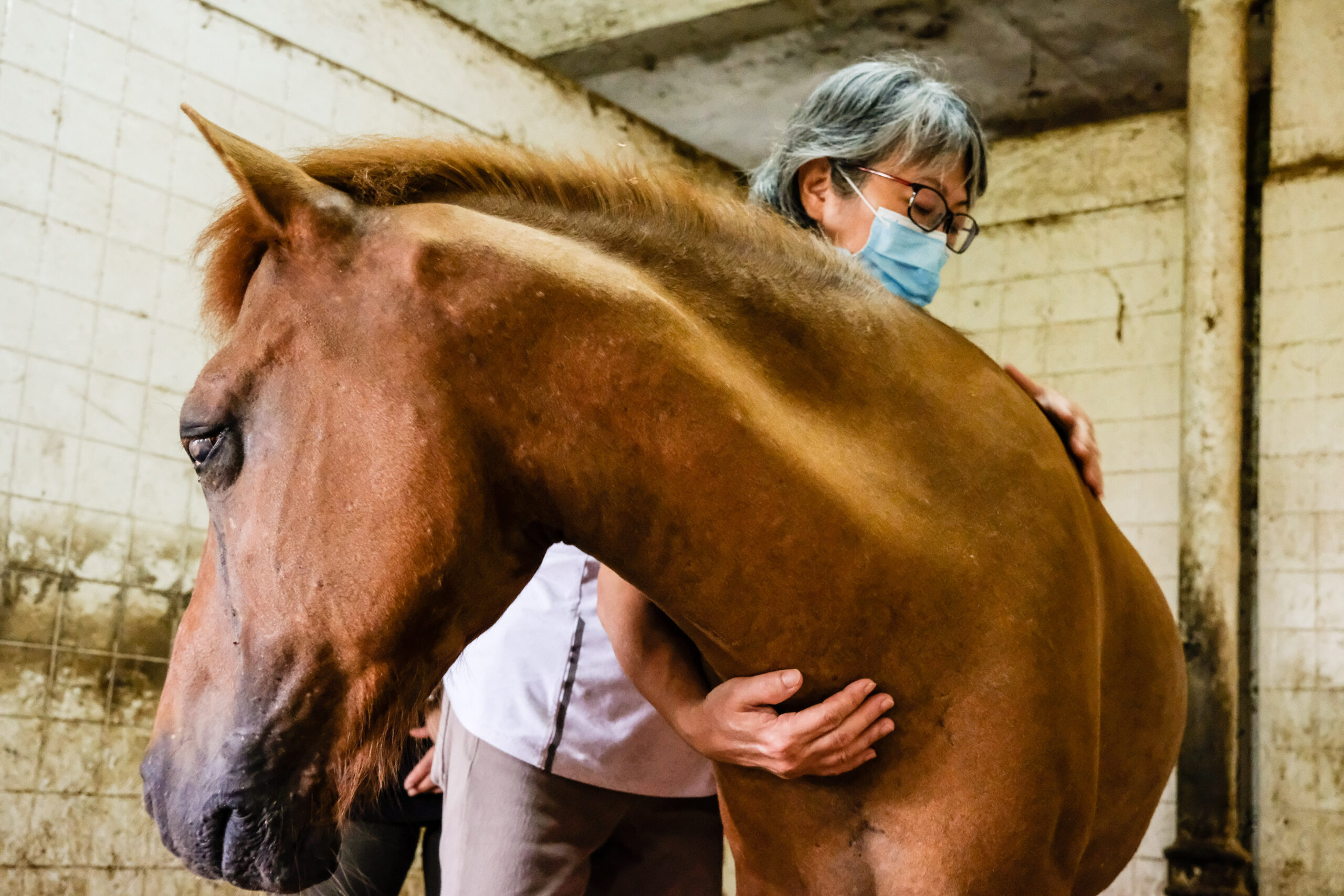
Healing horses
Equine assisted therapy is an experiential mental health treatment method that uses the connection between people and horses to enhance physical or emotional healing. Research has indicated that it is effective for treating people experiencing depression, anxiety, and/or trauma-related symptoms, as well as ADHD, autism, dissociative disorders, and other mental health conditions.
Although it has been on the radar of health professionals and patients for over half a century, the recognition of therapeutic riding stretches back to Greece in the 5th century BCE.
While it is established in places such as Europe, United States and Australia, equine-assisted intervention remains somewhat of a niche in land-scarce Singapore, only gaining traction over the last couple of years.
Long-standing stigmas around topics of mental health have hindered the ascent of practices outside traditional talking therapies.
A 2017 survey of Singaporean young people cited by global health services company Cigna, found that around 44.5% of respondents associated mental illnesses with negative, derogatory terms like “stupid”, “dangerous”, “crazy” and “weird” and 46.2% of them said they would be “very embarrassed” if they were diagnosed with a mental illness.
The pandemic and its lockdowns further exacerbated the urgency for increased mental health awareness. Samaritans of Singapore, a suicide prevention organisation, received over 39,000 calls for help in 2020, during the height of the city-state’s covid restrctions, an 18% increase from the year before.
HERD founders, Chan Li Wen, Jamie Lee, Pearlyn Yap and Sharifah Faizah first met while developing and running equine assisted learning programmes at an animal-assisted intervention centre in Singapore. The current team also includes their equine consultant and mentor, Mr Tommy Wong, who has more than 30 years of experience in the equine industry.
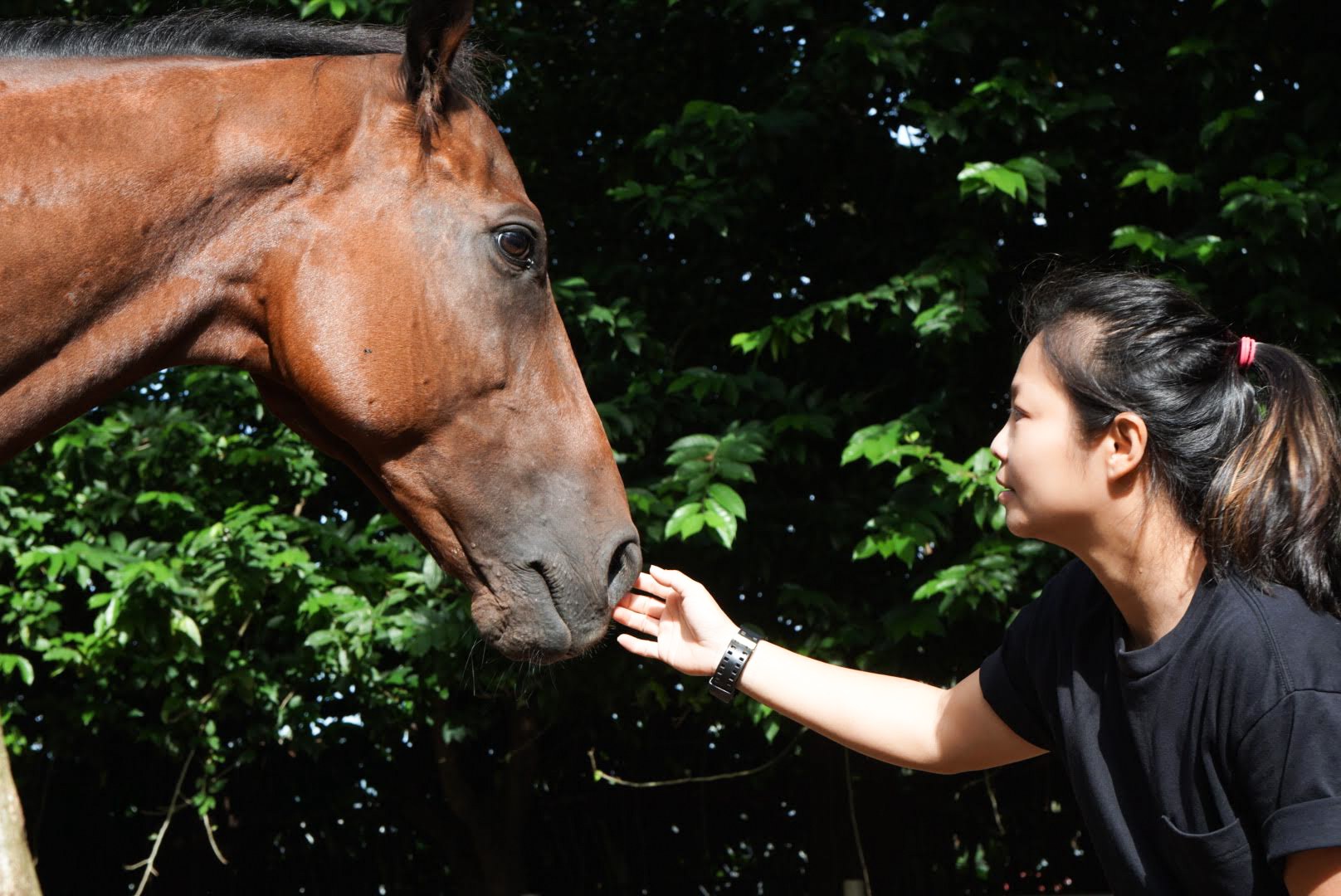
Their experience at the centre fuelled their belief in the therapeutic potential of animals, especially horses.
They have worked with a variety of beneficiaries such as schools, orphanages, family service centres and nursing homes and have combined experience in social work, counselling, special needs, stable operations, natural horsemanship, programme development and equine-assisted learning facilitation.
The team hold full -time jobs and spend their after-work hours doing curriculum planning and administrative work for HERD. On the weekends, it’s dedicated to sessions with the horses and clients. The programmes are supported by the Gallop Stable (a riding centre that rescues and supports retired racehorses).
Their first session at the end of February catered to a family with members aged from 7 years to 77 years.
“We’ve seen our clients present their most vulnerable side with horses, and what they share with the horses can be unique and different (than other forms of therapy),” explained Liwen.
You don’t choose the horse, but the horses choose to work with you”
Jamie Lee, HERD co-founder
For now, they are targeting to work with families looking for bonding activities.
Through these exploratory “horse-led activities” like grooming and interaction, it opens up conversations about family dynamics, love language, communication styles, self-awareness, according to co-founder Lee.
Horses are prey animals and are extremely sensitive to the environment. They are acutely attuned to the smallest changes like tone of voice, body language, behaviours, and emotions.
The horses in the programme need to have the right temperament and willingness to work with clients. But most importantly, the team subscribes to a unique philosophy – “you don’t choose the horse, but the horses choose to work with you in a mutually beneficial relationship,” Lee said.
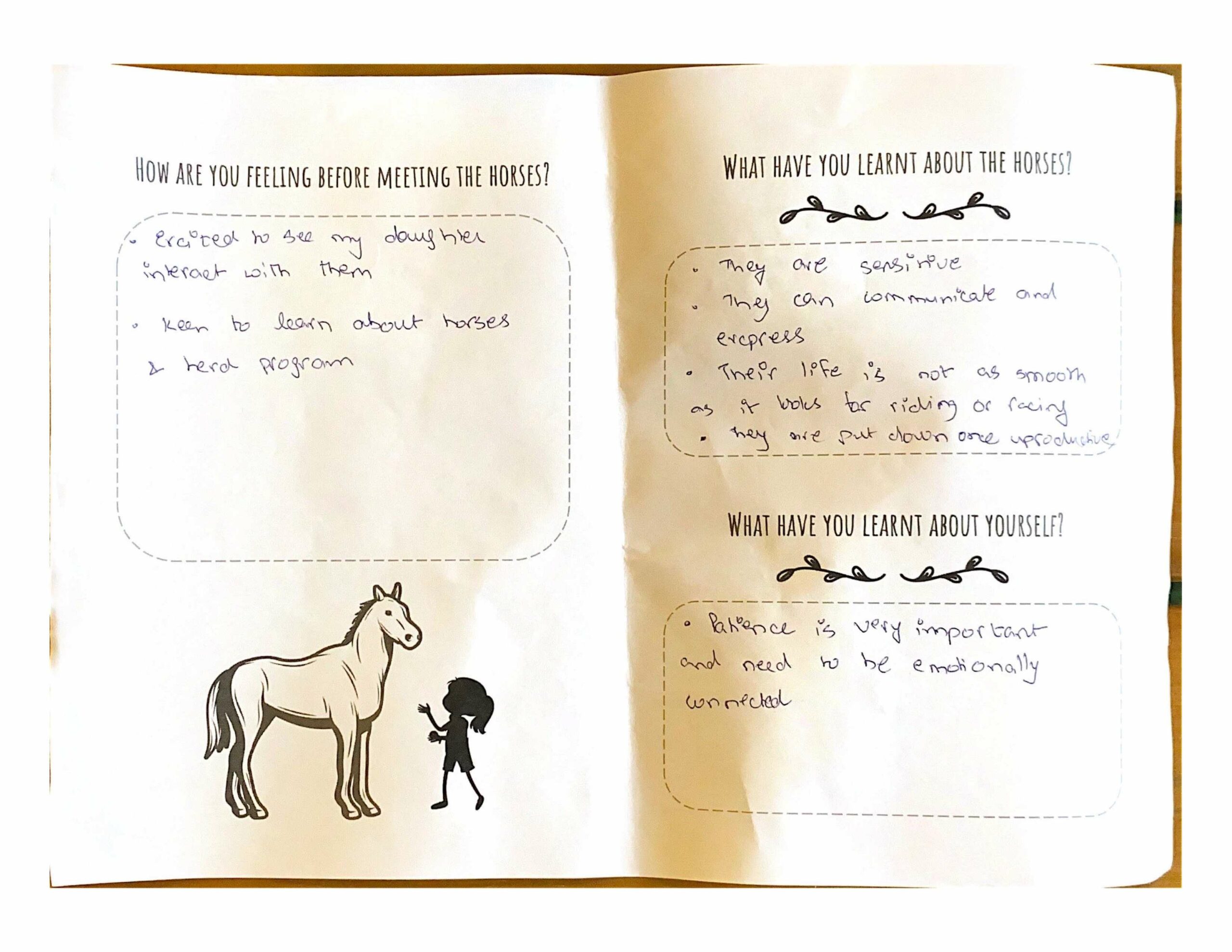
On board is Stardom, a visually impaired horse, Big Ben, a massive thoroughbred who retired from his racing career, Dawn Don, a senior horse, Disney and Snowy, all of whom “seemed to want to connect and were interested in human interactions,” said Chan.
She recalled how Snowy appeared initially reluctant to interact with visitors, turning away whenever they approached her.
She added, “But we took her out, spent some time with her and gave her a good groom. She was enjoying the attention so much until her legs almost gave way because it was too shiok (a Singlish word to express a good feeling or extreme satisfaction).”
While it’s early days yet, the team hope to make their programmes more accessible to the general public and to change the perception that it is restricted to an exclusive or wealthy group.
They also hope to train up a pool of volunteers to learn about animal assisted intervention, and to plan programmes centred on respite care, practising mindfulness and reducing anxiety.
“There are so many more people who need this but can’t reach it, like stressed out caregivers or special needs individuals… a caring society is one surrounded by nature and animals,” said Yap.
Helping young and old
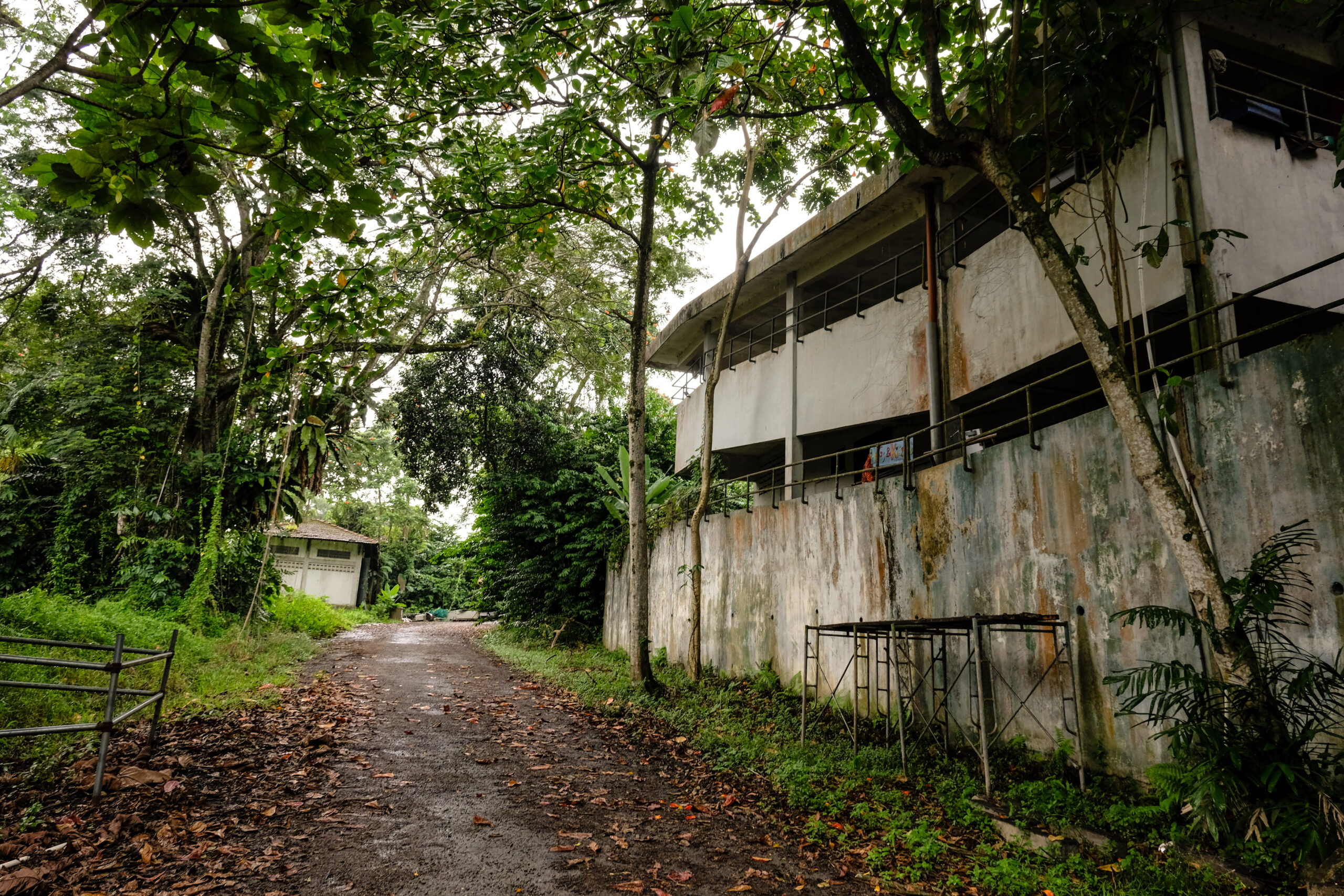
In a densely populated urban city-state such as Singapore, exposure to green spaces is paramount to mental health.
With intervention methods like art therapy or counselling, a lot happens indoors, mostly in a closed space.
For someone who may be cooped up at home in front of a computer experiencing stress, this gives them the option of being in a simple country-like space where they can experience animal-assisted programmes and find healing and balance,” explained Sandra Leong, chief executive of charity Equal-Ark Singapore, who joined the organisation in January.
For the last seven years, Equal has been running equine-assisted intervention programmes for hundreds of youths, people with special needs, caregivers and seniors with debilitating conditions like clinical depression or dementia.
The place is home to 10 retired horses (including polo horses, racehorses and school horses) and six playful Argentinian falabellas or miniature horses.
The team believes that interacting with horses offers the elderly a different type of psycho-social care, many of whom have never had a chance to see a real horse up close.
One in ten people aged 60 and above in Singapore has dementia, according to a nationwide study.
Zherwin Acosta, Equal’s head of animal welfare and operations, recounted how many frail and wheelchair-bound elderly clients were reluctant to go near the horse at first, but ended up warming to these gentle giants and wanting to groom and feed them. Some patients with dementia can vividly remember the horse’s name even after a visit.
They’ve also brought the miniature horses out to the community too like nursing homes and schools for special needs children – they are so tiny that they can easily fit into building lifts and be transported four at a time in the horse trailer.
For the youths, such programmes also build their self-esteem, social awareness and confidence and values like perseverance. In Equal’s signature “Cross the River” horseplay game, students have to work as a team to guide a horse across a make-believe river.
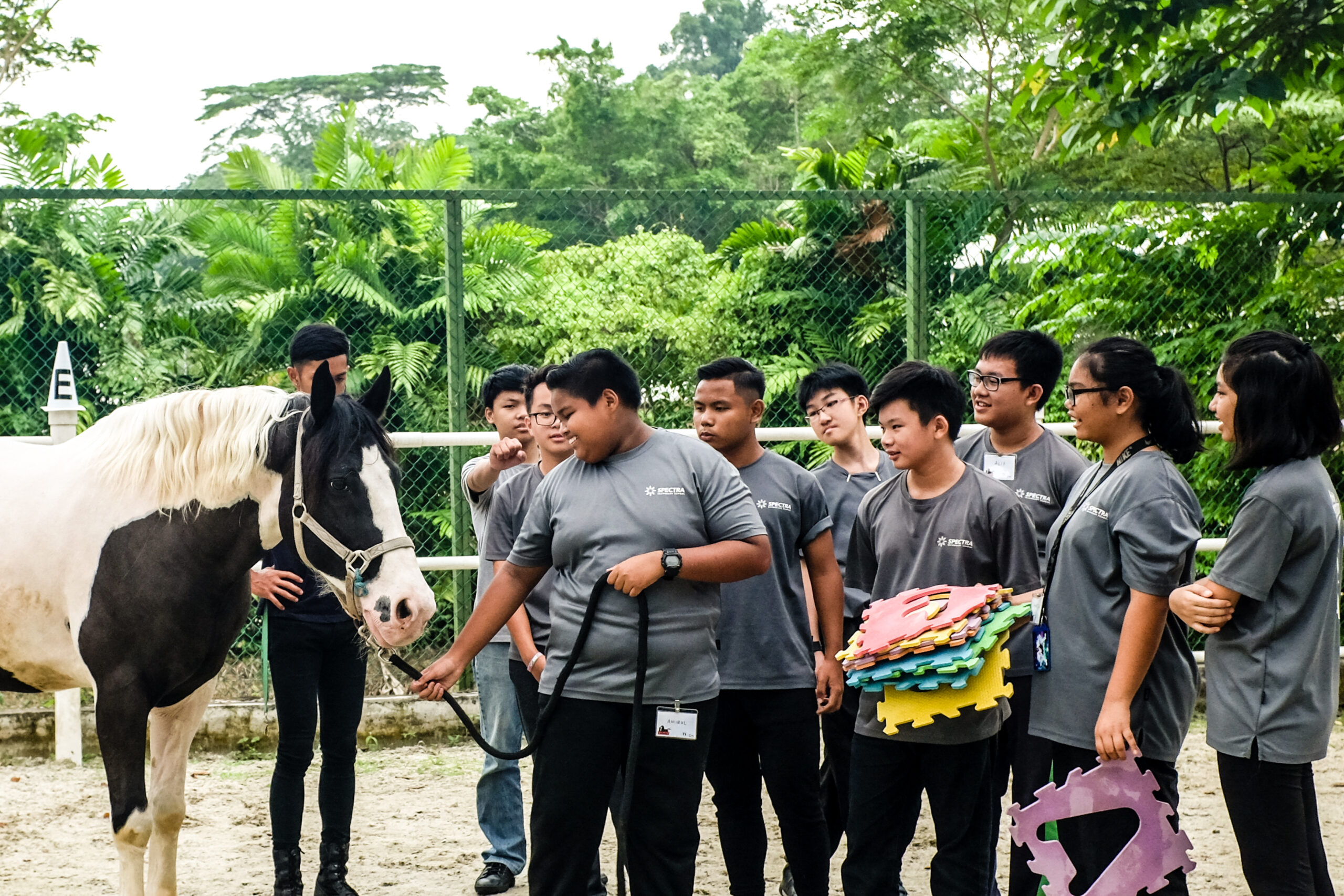
Acosta recalls how one boy refused to engage in the first session, preferring to linger in the corner by himself. But when they brought one miniature horse beside him, they witnessed a transformation.
“He started to lead the horse by himself. By the second session, he asked if he could have two. Seeing him progress from this quiet boy to someone confident… It really brings youths like him out of their shell,” said Acosta.
While they had to organise smaller breakout groups and scale down sessions at the height of Covid-19, things are looking to get back on track this year.
As Leong led the horse Ribena out to the pasture to graze, she talked passionately about their upcoming plans to make their services more accessible to the community and to ramp up their outreach.
2022 will see them reaching out to more groups of beneficiaries, collaborating with other social service agencies, and bringing on more minded partners to bring its animal-assisted programmes to more people.
“While we ride out the tail-end of Covid-19, we are seeing deeper social issues that may need a multi-intervention approach. We are also seeing pent-up demand by individuals and families seeking help and meaningful experiences,” said Leong.
“What’s really amazing about horses is that they can have a beautiful connection and interact in a gentle yet transformational way with those we serve.”


